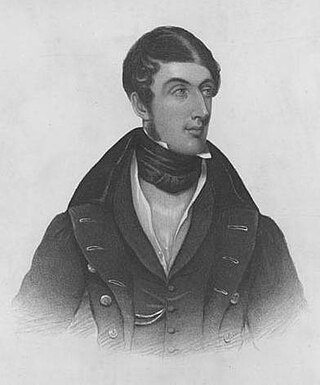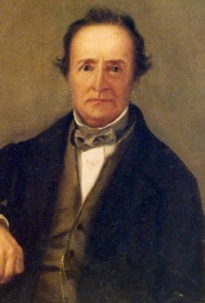Related Research Articles

The Province of Canada was a British colony in British North America from 1841 to 1867. Its formation reflected recommendations made by John Lambton, 1st Earl of Durham, in the Report on the Affairs of British North America following the Rebellions of 1837–1838.
Durham most commonly refers to:

Charles Poulett Thomson, 1st Baron Sydenham, was a British businessman, politician, diplomat and the first Governor General of the united Province of Canada.

Peterborough County is a county and census division located in Southern Ontario, Canada. The county seat is The City of Peterborough, which is independent of the county.

York County is a historic county in Upper Canada, Canada West, and the Canadian province of Ontario. It was organized by the Upper Canada administration from the lands of the Toronto Purchase and others.

The Newcastle District was a historic district in Upper Canada which existed until 1849. It was formed in 1802 from the Home District, consisting of the counties of Durham and Northumberland.

George Strange Boulton was a lawyer and political figure in Upper Canada.
John Prince, was a lawyer, militia officer, gentleman farmer and political figure in Upper Canada and Canada West.
Alexander McDonell, Esq. was an immigration agent, military officer and member of the Legislative Assembly of Upper Canada. After immigrating from Scotland to Upper Canada he fought in the War of 1812 with the Canadian fencibles. He later served as a Colonel and assembled a militia to help quell the Upper Canada Rebellion, although they were never called to action. He spent most of his professional life as a Crown agent in the area surrounding Peterborough, Ontario assigning plots of land to settlers, advocating for projects to improve the infrastructure, and settling disputes as a Justice of the Peace. He was elected to the Legislative Assembly of Upper Canada in 1834 and reelected in 1836 by relying on his reputation after helping settlers and running on a pro-British platform. He lost his election to the Legislative Assembly of the Province of Canada in 1841 and became a lumberjack after his retirement in 1843.
Stephen Sewell Foster was a physician and political figure in Canada East.

Elmes Yelverton Steele was a British naval officer, and militia officer, farmer and political figure in Canada West, Province of Canada. The father of a large family, one of his sons was Sam Steele, an officer in the early days of the North-West Mounted Police.
The Special Council of Lower Canada was an appointed body which administered Lower Canada until the Union Act of 1840 created the Province of Canada. Following the Lower Canada Rebellion, on March 27, 1838, the Constitutional Act of 1791 was suspended and both the Legislative Assembly and Legislative Council were dissolved.
Edward Greive was a businessman and political figure in Canada East. He was also the brother-in-law of William Walker and son-in-law of Mathew Bell.
Samuel Street Wilmot was a surveyor, tanner, farmer and political figure in Upper Canada. He represented Durham in the Legislative Assembly of Upper Canada from 1820 to 1824.

Robert Jones was a political figure in Canada East, in the Province of Canada. He represented Missiskoui in the Legislative Assembly of the Province of Canada from 1841 to 1844. He also served as a member of the Legislative Council of Lower Canada from 1832 to 1838 and the Legislative Council of the Province of Canada from 1849 to 1850.
John Moore was a contractor and political figure in Lower Canada, first serving in the Legislative Assembly of Lower Canada and then the Legislative Assembly of the Province of Canada. He initially was a strong supporter of the Governor General, appointed by the British government, but gradually shifted towards a Reform viewpoint, where the elected Legislative Assembly would have greater powers. Little is known of his life.
John Warren was a merchant and political figure in Upper Canada. He represented Haldimand in the Legislative Assembly of Upper Canada from 1831 to 1832.
John Kearns was an Irish-born farmer and political figure in Upper Canada. He represented Prescott in the Legislative Assembly of Upper Canada from 1836 to 1841 as a Conservative.

The Parliament of the Province of Canada was the legislature for the Province of Canada, made up of the two regions of Canada West and Canada East.
Durham was an electoral district of the Legislative Assembly of the Parliament of the Province of Canada, in Canada West, on the north shore of Lake Ontario. It was created in 1841, upon the establishment of the Province of Canada by the union of Upper Canada and Lower Canada. Durham was represented by one member in the Legislative Assembly. It was abolished in 1867, upon the creation of Canada and the province of Ontario.
References
- Johnson, J.K. (1989). Becoming Prominent: Leadership in Upper Canada, 1791-1841. ISBN 0-7735-0641-1.